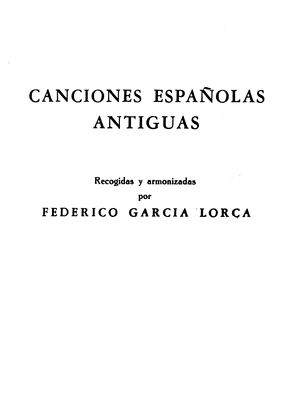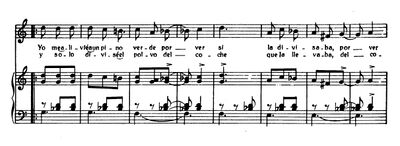Difference between revisions of "Anda, jaleo"
| (13 intermediate revisions by the same user not shown) | |||
| Line 1: | Line 1: | ||
{{Short description|Song | {{Short description|Song by Garcia Lorca}}<!-- no repetition of page title--> | ||
{{Infobox musical composition | {{Infobox musical composition | ||
| name = 13 Canciones españolas antiguas <!-- use |list_title= if list --> | | name = 13 Canciones españolas antiguas <!-- use |list_title= if list --> | ||
| Line 57: | Line 57: | ||
}} | }} | ||
'''{{lang|es| | '''"{{lang|es|Anda, jaleo}}"''' is a song from the {{lang|es|13 Canciones españolas antiguas}} by [[Federico García Lorca]]. <ref name="Wiki"/> | ||
Lorca's literary achievements are legend, however, he was a prolific collector, composer as well as a frequent performer of his works. He collected and curated many Spanish folk songs mainly from Andalusia. His ''13 Canciones españolas antiguas'' are well-loved and often performed to the present day.<ref name="ConcertNotes"/> | |||
Anda, jaleo became a song of the Spanish resistance | |||
''"Anda, jaleo"'' became a powerful resistance song during the Spanish Civil War and resurfaced as a Flamenco song after Franco.<ref name="ConcertNotes"/> | |||
{| class="wikitable" | {| class="wikitable" | ||
| Line 115: | Line 72: | ||
|- | |- | ||
| 2021 | | [[2021]] | ||
| [[À sa guitare (Album)]] | | [[À sa guitare (Album)]] | ||
| [[Thibaut Garcia]] | | [[Thibaut Garcia]] | ||
|} | |} | ||
==Libretto== | |||
<!-- The box above is defined in Template:Custom/songinfo.css --> | |||
<!-- The classes of the libretti are defined in Template:Custom/pjwiki.css --> | |||
<!-- Place <div class="wrapperlibretti"> on top of the libretto and close it in the end.--> | |||
<!-- Use Template:Libretti, not custom HTML on the page.--> | |||
<div class="twentieth"> | |||
{{Song header | |||
| title = Anda, jaleo | |||
| english-title = | |||
| composer = [[Federico García Lorca]] | |||
| lyricist = [[Federico García Lorca]] | |||
| work = [[13 Canciones españolas antiguas]] | |||
| role = | |||
}}</div> | |||
{{Clear|left}} | |||
<div class="wrapperlibretti"> | |||
<!--IMPORTANT! Credit your own translations in any way you want. Uncredited translations may cause us problems.--> | |||
{{Libretti | |||
| country =Spain | |||
| language-note = | |||
| libretto-text =<poem>{{lang|es|Yo me arrimé a un pino verde | |||
por ver si la divisaba | |||
y sólo divisé el polvo | |||
del coche que la llevaba. | |||
¡Anda, jaleo, jaleo! | |||
Ya se acabó el alboroto | |||
y vamos al tiroteo. | |||
No salgas, paloma, al campo, | |||
mira que soy cazador, | |||
y si te tiro y te mato, | |||
para mí será el dolor, | |||
para mí será el quebranto. | |||
¡Anda, jaleo, jaleo! | |||
Ya se acabó el alboroto | |||
y vamos al tiroteo. | |||
Por la calle de los Muros | |||
han matado una paloma. | |||
Yo cortaré con mis manos | |||
las flores de tu corona. | |||
¡Anda, jaleo, jaleo! | |||
Ya se acabó el alboroto | |||
y vamos al tiroteo.}}<ref name="IMSLP"/></poem> | |||
}}{{Libretti | |||
| country =United Kingdom | |||
| language-note = | |||
| libretto-text =<poem>I climbed up a green pine tree | |||
to see if I could see her | |||
and I only saw the dust | |||
of the carriage (or car) that was carrying her. | |||
Come on, make a noise, make a noise! | |||
The ruckus has died down | |||
And let’s go to a gunfight. | |||
Don't fly out, little dove, into the field, | |||
Beware because I am a hunter | |||
and if I shoot you and kill you, | |||
It is me who will suffer. | |||
It is me who will be in pain. | |||
Come on, make a noise, make a noise! | |||
The ruckus has died down | |||
And let’s go to a gunfight. | |||
On the calle de los Muros | |||
they have killed a dove | |||
With my own hands I will cut | |||
The flowers off your crown. | |||
Come on, make a noise, make a noise! | |||
The ruckus has died down | |||
And let’s go to a gunfight.<ref name="English"/></poem> | |||
}}{{Clear|left}} | |||
</div> | |||
{{Clear|left}} | |||
==Sources== | ==Sources== | ||
[[File:Incipit anda jaleo.jpg|400px|thumb|alt=Incipit of Anda, jaleo|Incipit of "Anda, jaleo"]] | [[File:Incipit anda jaleo.jpg|400px|thumb|alt=Incipit of Anda, jaleo|Incipit of "Anda, jaleo"]] | ||
| Line 142: | Line 176: | ||
|quote=}} | |quote=}} | ||
*Orchestra material | *Orchestra material | ||
e. g.: | :e. g.: | ||
:Canciones espagñolas antiguas, daraus: El cafe de chinitas, Anda jalero und Los pelegrinitos : für Orchester | :Canciones espagñolas antiguas, daraus: El cafe de chinitas, Anda jalero und Los pelegrinitos : für Orchester | ||
:García Lorca, Federico (Komponist) | :García Lorca, Federico (Komponist) | ||
| Line 244: | Line 278: | ||
|archive-date={{date|2021-10-01|MDY}} | |archive-date={{date|2021-10-01|MDY}} | ||
|quote=}}</ref> | |quote=}}</ref> | ||
<ref name="English">Translation to English: Birikein & FR, 2021</ref> | |||
}} | }} | ||
[[Category:Music]] | [[Category:Music]] | ||
[[Category:20th-century music]] | [[Category:20th-century music]] | ||
[[Category:secular]]<!-- secular or sacred --> | [[Category:secular]]<!-- secular or sacred --> | ||
Latest revision as of 12:07, 13 October 2021
| 13 Canciones españolas antiguas | |
|---|---|
| by Federico García Lorca | |
 Cover of 13 Canciones españolas antiguas | |
| English | 13 Ancient Spanish Songs |
| Composed | before 1931 |
| Performed | 1931 |
| Published | 1961 and 1964 |
"Anda, jaleo" is a song from the 13 Canciones españolas antiguas by Federico García Lorca. [1]
Lorca's literary achievements are legend, however, he was a prolific collector, composer as well as a frequent performer of his works. He collected and curated many Spanish folk songs mainly from Andalusia. His 13 Canciones españolas antiguas are well-loved and often performed to the present day.[2]
Anda, jaleo became a song of the Spanish resistance
"Anda, jaleo" became a powerful resistance song during the Spanish Civil War and resurfaced as a Flamenco song after Franco.[2]
| Year | Album | With |
|---|---|---|
| 2021 | À sa guitare (Album) | Thibaut Garcia |
Libretto
from 13 Canciones españolas antiguas
Federico García Lorca (music), Federico García Lorca (words)
Yo me arrimé a un pino verde | |
I climbed up a green pine tree | |
Sources
- Free Score at the IMSLP:
- 13 Canciones españolas antiguas
- For Voice and Piano
- Madrid: Unión Musical Española, 1961.
- "Canciones españolas antiguas (García Lorca, Federico)". Archived from the original on October 1, 2021. Retrieved October 1, 2021.
- Orchestra material
- e. g.:
- Canciones espagñolas antiguas, daraus: El cafe de chinitas, Anda jalero und Los pelegrinitos : für Orchester
- García Lorca, Federico (Komponist)
- Gasull Altisent, Federico (Arrangeur)
- Publisher: Madrid : Union Musical Ediciones
- Distributor: Edition Wilhelm Hansen, Administration: Int. Musikverlage Hans Sikorski
- Orch (19 Stimmen)
- Permalink: d-nb
.info /400605317
13 Canciones españolas antiguas in Philippe Jaroussky's discography, filmography and performance history
Solo Albums/Recital albums
| Year | Album |
|---|---|
| 2021 | À sa guitare (Abum) |
Concert programs
So far, "Anda, jaleo" is not part of any concert program.
Complete list of musical numbers from 13 Canciones españolas antiguas
This listing only contains the musical pieces performed and/or recorded by Philippe Jaroussky.
| Year published or performed | title | Album, Video or Concert Program | Year first published/performed |
|---|---|---|---|
| 2021 | Anda, jaleo | À sa guitare (Abum) | 1961[3] |
References
- ↑ "Garcá Lorca". Wikipedia. Archived from the original on October 1, 2021. Retrieved October 1, 2021.
- ↑ 2.0 2.1 "Canciones españolas antiguas". Archived from the original on October 1, 2021. Retrieved October 1, 2021.
- ↑ 3.0 3.1 "Canciones españolas antiguas (García Lorca, Federico)". Archived from the original on October 1, 2021. Retrieved October 1, 2021.
- ↑ Translation to English: Birikein & FR, 2021
